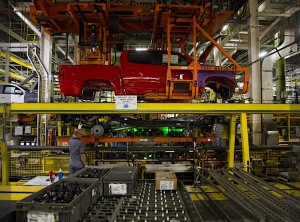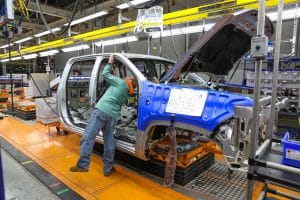General Motors is preparing to step up production next week by adding shifts at truck plants in Missouri, Indiana and Michigan and starting production at crossover plants in the U.S. and Canada even as the number of COVID-19 deaths rise in Ciudad Juarez, Mexico, an industrial city on the U.S.-Mexican border.
The company, however, said it’s ready to increase production of light-duty trucks and crossovers.
“The restart of vehicle production at General Motors’ component and assembly plants in North America has gone smoothly thanks to strong teamwork. Our comprehensive safety procedures are working well, and our suppliers have done a great job implementing their return-to-work strategies and safety playbooks,” GM said in a statement.
(GM delaying start up for second shifts at three North American truck plants.)
“We are now in a position to increase production to meet strengthening customer demand and strong dealer demand. Starting Monday, three crossover assembly plants in the United States and Canada will be operating two production shifts, and three U.S. assembly plants building mid- and full-size pickups will move from one- to three-shift operations,” GM said.
Last week GM officials confirmed that they had limited truck production despite the declining inventory of pickup trucks on dealer lots because of parts shortages created by bottlenecks at supplier plants in Mexico.
GM resumed production at its own plants in Mexico this week with the approval of the Mexican government, which said the automaker had met Mexico’s requirements for protecting workers. However, the resumption of production in Mexican plants supplying parts to the North American auto industry has been more chaotic.
As GM restarted its light-truck plants, Mercedes-Benz halted production in Alabama because of a shortage of parts made in Mexico. Volkswagen also delayed the start of production and Toyota sent teams in Mexico to check on its suppliers in Mexico, according Chris Reynolds, Toyota’s chief administrative officer.
However, in recent weeks Ciudad Juarez, the center of a large network of maquiladora plants that produce a variety of products – including automotive components that are shipped to factories and stores in the United States – has seen a wave of labor unrest created by the spread of the coronavirus.
The turbulence included a series of brief strikes and more recently protests about the failure of international companies to pay workers for staying home during the pandemic as required by the Mexican government.
(GM moving to reopen plants in Mexico.)
In addition, Mexican news websites have run articles accusing large employers in Ciudad Juarez of ignoring the deaths of dozens of their workers.
The La Izquierda Diario Mexico website charged that 30 employees of Lear Corp., one of North America’s largest auto suppliers, have died from COVID-19. It also said Foxxconn has had 15 employees die and Regal has had 10, but it was not clear from the story whether the victims contracted the disease at home, in their neighborhood or at work, though the story did label the deaths “industrial homicide.”
Lear has 10 plants and roughly 30,000 employees in and around Ciudad Juarez, making seat covers and wiring harnesses.
Under pressure from global automakers, the Mexican government has allowed the country’s automotive plants to re-open ahead of lifting the nationwide lockdown.
Meanwhile, the number of coronavirus cases in Mexico and in Ciudad Juarez is on the rise. Charts compiled by the World Health Organization show the number of coronavirus case climbing steadily in Ciudad Juarez, which now has reported 283 deaths. The Mexican government has been accused of understating the number of deaths related to COVID-19 across the country.
The U.S. State Department website advises caution for any U.S. citizen traveling to and from Mexico because of the coronavirus.
(GM says no new COVID-19 cases, expects U.S. production back to normal in four weeks.)
“The United States and Mexico entered a joint initiative March 21 restricting non-essential travel along the U.S.-Mexico land border to prevent the spread of the COVID-19 virus. Non-essential travel includes travel that is considered tourism or recreational in nature. The restrictions are in place until at least June 22,” the department’s website noted.


